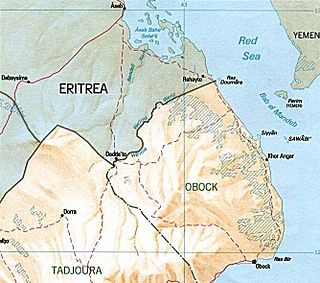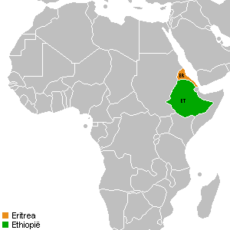
The United Nations Mission in Ethiopia and Eritrea (UNMEE) was established by the United Nations Security Council in July 2000 to monitor a ceasefire in the border war that began in 1998 between Ethiopia and Eritrea. First military troops Netherlands - Canadian battalion 'NECBAT' arrived and established bases in the region in December 2000.

The Djiboutian–Eritrean border conflict was a border conflict between the forces of Djibouti and Eritrea occurred between June 10 and June 13, 2008. It was triggered by tension which began on April 16, 2008, when Djibouti reported that Eritrean armed forces had penetrated into Djibouti and dug trenches on both sides of the border. The crisis deepened when armed clashes broke out between the two armed forces in the border area on June 10, 2008. During the conflict, France provided logistical, medical and intelligence support to Djibouti, but did not participate in direct combat.

United Nations Security Council resolution 1226, adopted unanimously on 29 January 1999, after reaffirming Resolution 1177 (1998) on the situation between Eritrea and Ethiopia, the Council strongly urged Eritrea to accept an agreement proposed by the Organisation of African Unity (OAU) to resolve the conflict between the two countries.

United Nations Security Council resolution 1227, adopted unanimously on 10 February 1999, after reaffirming resolutions 1177 (1998) and 1226 (1999) on the situation between Eritrea and Ethiopia, the Council demanded an immediate cessation of hostilities between the two countries.

United Nations Security Council resolution 1297 was adopted unanimously on 12 May 2000, after reaffirming resolutions 1177 (1998), 1226 (1999) and 1227 (1999) on the situation between Eritrea and Ethiopia. The Council demanded an immediate end to hostilities between the two countries.

United Nations Security Council resolution 1298, adopted unanimously on 17 May 2000, after reaffirming resolutions 1177 (1998), 1226 (1999), 1227 (1999) and 1297 (2000) on the situation between Eritrea and Ethiopia, the Council condemned continuing hostilities and imposed an arms embargo on both countries.
United Nations Security Council resolution 1312, adopted unanimously on 31 July 2000, after reaffirming resolutions 1298 (1999) on the situation between Eritrea and Ethiopia, and 1308 (2000), the council established the United Nations Mission in Ethiopia and Eritrea (UNMEE) in anticipation of a peacekeeping operation subject to future authorisation.

United Nations Security Council resolution 1320, adopted unanimously on 15 September 2000, after reaffirming resolutions 1298 (1999), 1308 (2000) and 1312 (2000) on the situation between Eritrea and Ethiopia, and 1308 (2000), the Council deployed a military component as part of the United Nations Mission in Ethiopia and Eritrea (UNMEE) and extended its mandate until 15 March 2001.

United Nations Security Council resolution 1398, adopted unanimously on 15 March 2002, after reaffirming resolutions 1298 (1999), 1308 (2000), 1312 (2000), 1320 (2000), 1344 (2001) and 1369 (2001) on the situation between Eritrea and Ethiopia, the council extended the mandate of the United Nations Mission in Ethiopia and Eritrea (UNMEE) until 15 September 2002.

United Nations Security Council resolution 1430, adopted unanimously on 14 August 2002, after reaffirming Resolution 1398 (2002) on the situation between Eritrea and Ethiopia, the Council adjusted the mandate of the United Nations Mission in Ethiopia and Eritrea (UNMEE) to assist in the implementation of the decision of the Eritrea-Ethiopia Boundary Commission.

United Nations Security Council resolution 1466, adopted unanimously on 14 March 2003, after reaffirming all resolutions on the situation between Eritrea and Ethiopia, particularly Resolution 1434 (2002), the council extended the mandate of the United Nations Mission in Ethiopia and Eritrea (UNMEE) until 15 September 2003.

United Nations Security Council resolution 1507, adopted unanimously on 12 September 2003, after reaffirming all resolutions on the situation between Eritrea and Ethiopia, particularly Resolution 1466 (2003), the Council extended the mandate of the United Nations Mission in Ethiopia and Eritrea (UNMEE) until 15 March 2004.

United Nations Security Council resolution 1622, adopted unanimously on 13 September 2005, after reaffirming all resolutions on the situation between Eritrea and Ethiopia, particularly Resolution 1586 (2005), the Council extended the mandate of the United Nations Mission in Ethiopia and Eritrea (UNMEE) until 15 March 2006.

United Nations Security Council resolution 1640, adopted unanimously on 23 November 2005, after reaffirming all resolutions on the situation between Eritrea and Ethiopia, particularly Resolution 1622 (2005), the Council demanded that Eritrea lift restrictions on the movement of the United Nations Mission in Ethiopia and Eritrea (UNMEE).

United Nations Security Council Resolution 1670, adopted unanimously on April 13, 2006, after reaffirming all resolutions on the situation between Eritrea and Ethiopia, particularly resolutions 1640 (2005) and 1661 (2006), the Council extended the mandate of the United Nations Mission in Ethiopia and Eritrea (UNMEE) for a period of one month until May 15, 2006.

United Nations Security Council Resolution 1710, adopted unanimously on September 29, 2006, after reaffirming all resolutions on the situation between Eritrea and Ethiopia, particularly resolutions 1320 (2000), 1430 (2003), 1466 (2003), 1640 (2005) and 1681 (2006), the Council extended the mandate of the United Nations Mission in Ethiopia and Eritrea (UNMEE) for four months until January 31, 2007.
United Nations Security Council Resolution 1798 was unanimously adopted on 30 January 2008.
United Nations Security Council Resolution 1862 was unanimously adopted on 14 January 2009.
Events in the year 1999 in Eritrea.
Events in the year 1998 in Eritrea.










